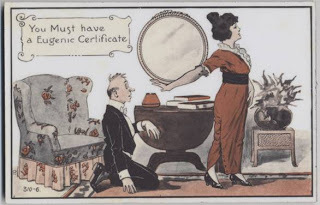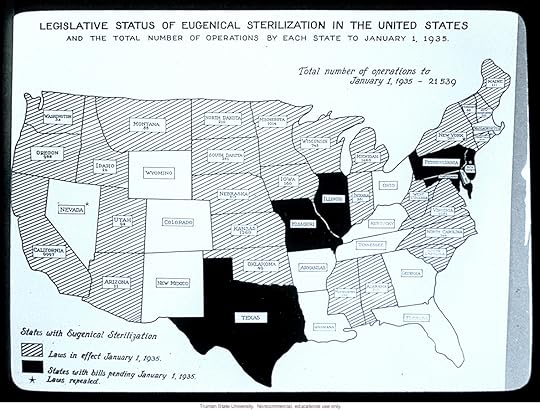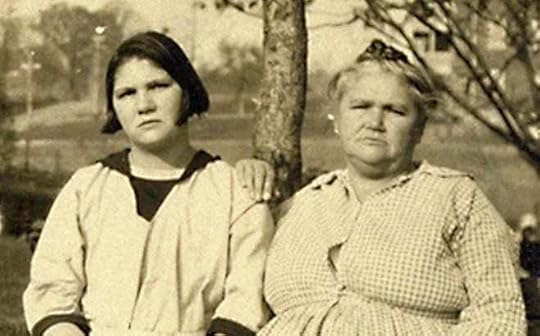Science for Authors: Eugenics
 After Monday's post, I thought I'd dig through my archives and post again about a fascinating (if not horrible) topic. It's something that I've taught in my classes for as long as I can remember, to the point where I still have students regularly send me articles they come across dealing with eugenics. It's very, very interesting, mainly due to the ethical dilemma: we all want a better world for ourselves and future generations...but how far are we willing to go to get it? Hopefully no one thinks that some of the principles described below are ever a good idea to try out again!
After Monday's post, I thought I'd dig through my archives and post again about a fascinating (if not horrible) topic. It's something that I've taught in my classes for as long as I can remember, to the point where I still have students regularly send me articles they come across dealing with eugenics. It's very, very interesting, mainly due to the ethical dilemma: we all want a better world for ourselves and future generations...but how far are we willing to go to get it? Hopefully no one thinks that some of the principles described below are ever a good idea to try out again!Anyhow, today I thought I'd talk a little about eugenics and the insanity that that phase of American history really was. It's only of my favorite topics to pontificate upon to my students, so hopefully you find it interesting :)
Anyhow, eugenics: basically the controlled breeding of humans to rid our species of undesirable traits. We did this with domesticated species like cattle, horses, and chickens, so why not with humans? That way we could get rid of genetic diseases like hereditary blindness, or mental characteristics like alcoholism and feeblemindedness (which is one of those ambiguous traits that basically just means mentally substandard). We can thank Francis Galton for the term, and a multitude of early scientists like Charles Davenport for making it extremely popular in the United States around the turn of the last century.
 A licence to state a person was fit to pass along their genes!Some of the ways eugenics principles were brought to the public at large included both "positive" and "negative" eugenics. Positive eugenics (if it really can be called that) was a means of promoting healthy breeding of individuals who would pass along good, high quality genes to the next generation. There were contests held at state fairs across the country to pick individuals & families who represented the best eugenics applications--such as the Fittest Family, or even the best eugenics sermon to be given from the pulpit.
A licence to state a person was fit to pass along their genes!Some of the ways eugenics principles were brought to the public at large included both "positive" and "negative" eugenics. Positive eugenics (if it really can be called that) was a means of promoting healthy breeding of individuals who would pass along good, high quality genes to the next generation. There were contests held at state fairs across the country to pick individuals & families who represented the best eugenics applications--such as the Fittest Family, or even the best eugenics sermon to be given from the pulpit. States with sterilization laws on the books. Negative eugenics was more on the force people to comply side of things. This included marriage laws between individuals who were deemed unfit (so alcoholics, epilectics, feebleminded, or individuals of a different 'races'), and many of the immigration laws from countries said to be less 'healthy.' Also, enforced sterilization of individuals of the same. One of the most horrifying case is that of Carrie Buck, which went all the way to the Supreme Court, where it was deemed okay to enforce sterilization on those deemed unfit to pass along their genes (based on the principle that it was okay to enforce vaccinations, no less!).
States with sterilization laws on the books. Negative eugenics was more on the force people to comply side of things. This included marriage laws between individuals who were deemed unfit (so alcoholics, epilectics, feebleminded, or individuals of a different 'races'), and many of the immigration laws from countries said to be less 'healthy.' Also, enforced sterilization of individuals of the same. One of the most horrifying case is that of Carrie Buck, which went all the way to the Supreme Court, where it was deemed okay to enforce sterilization on those deemed unfit to pass along their genes (based on the principle that it was okay to enforce vaccinations, no less!). Carrie Buck & her mother.
Carrie Buck & her mother. You may recognize the negative eugenics principles as those that Nazi Germany used--and it was the USA's early research and enforcement of these techniques that really spurred the Nazi's on. They took it to the next level with genocide, however the US's role shouldn't be overlooked.
Anyhow, eugenics is one of those insane periods in our history that often gets overlooked, though it had a massive influence around the world. I would honestly argue that the principles of eugenics are still lingering here and there under different names, despite the "falling out" of eugenics after WWII.
Can you think of any books or movies that deal with eugenics principles?
Published on May 18, 2016 04:00
No comments have been added yet.



